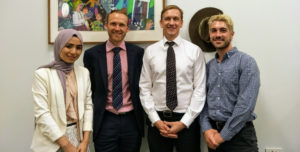For many refugees living in our community the challenges of resettlement can be exacerbated by the trauma of long-term separation from their immediate family. Over the past year Jesuit Social Services, the Catholic Alliance for People Seeking Asylum (CAPSA) and the Refugee Council of Australia (RCOA) have collaborated to raise public awareness of this issue through our #fairgoforfamilies campaign.
Earlier this month, representatives of Jesuit Social Services (who also participated on behalf of CAPSA), joined forces with RCOA to raise this issue directly with a number of federal MPs at Parliament House in Canberra. Rashid and Sahar (not their real names), both refugees from Afghanistan, travelled with us to Canberra and spoke powerfully of the challenges faced by families separated across borders and of the positive impact of reunification once it takes place. They generously and courageously shared their stories in the hope of making change.

Representatives from Jesuit Social Services and the Refugee Council of Australia with Julian Hill MP.
The pain of family separation has been a key concern for refugee communities in Australia. The tragedy of forcible displacement often means that refugee families are split across borders in their efforts to reach safety. In Australia, at present, there are a number of barriers that prevent family reunion. This includes the limitations on the number of places available for refugee family members under our humanitarian program, as well as Government directives that mean visa applications for those sponsored by someone who arrived by boat are given the lowest priority. As a result, family reunion is almost impossible for these refugees.
The reunification of refugee families is important for the Australian community, not only to protect the family as a fundamental building-block of our society, but also to foster greater social cohesion. We can all recognise that the family unit inherently warrants our respect and protection; that individuals should not be indefinitely nor arbitrarily separated from their spouse and children. However, reunited refugee families also benefit the Australian community: they lead to better settlement outcomes for refugees and to their more meaningful integration into the Australian community. It is in Australia’s interest to help as many refugees as possible reunite with their family and thereby foster more cohesive communities. A recent ReachTEL poll we conducted for this campaign showed us that 75% of Australians agree.
In Canberra we met with key immigration spokespersons from across the political spectrum, including the Australian Labor Party, the Nick Xenophon Team and the Australian Greens, as well as advisors from the Prime Minister’s Office. We raised our proposals for a modest increase in opportunities for family reunion and for the removal of processing barriers that disadvantage refugees. We know that these proposals may not be able to accommodate all refugees seeking to reunite their families, but they will make a significant difference for those who can. The personal stories shared by refugees themselves who have lived experience of seeking family reunification had a real impact on those we met with and brought our advocacy to life in a compelling way.
Jesuit Social Services was grateful for these MPs’ respectful engagement with our participants’ lived experiences and for their consideration of our campaign proposals. However, we need more Australians to make their views known to their local MPs. We need to keep up the pressure for more humane policies that give refugee families a fair go to establish new and productive lives in our communities.
For more information on the #fairgoforfamilies campaign, and to add your name to our petition, go to: https://capsa.org.au/fairgo/






